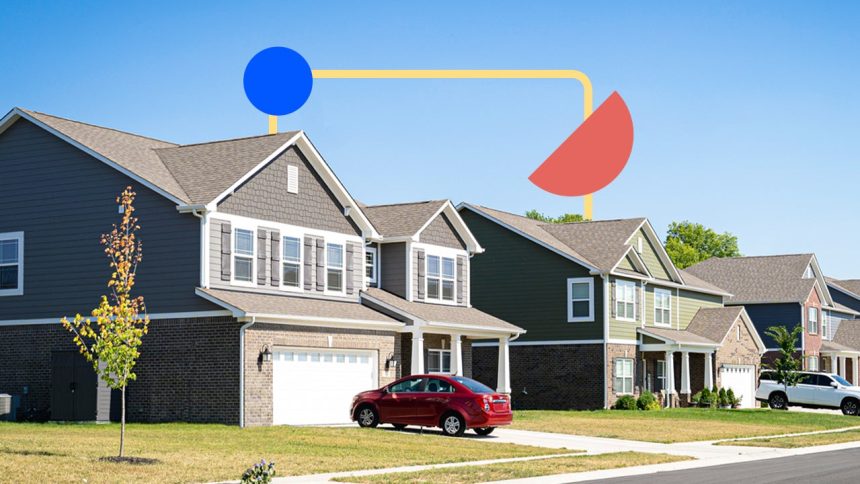Jaskaran Kooner/GettyImages; Illustration by Hunter Newton/Bankrate
Key takeaways
- FHA loan closing costs are typically 2 percent to 6 percent of a home’s purchase price. They’re charged in addition to the down payment requirement.
- FHA closing costs include an upfront mortgage insurance premium (MIP), lender and third-party fees and prepaid expenses.
- You can roll FHA closing costs into your mortgage, but then you’ll pay interest on these charges.
What are FHA closing costs?
FHA loan closing costs — like closing costs on a conventional loan — are upfront expenses that homebuyers pay to finalize the home sale. They include lender charges, like the origination fee, and fees for third-party services, such as title insurance and the appraisal. In the case of an FHA loan, closing costs involve a fee specific to the FHA loan program: mortgage insurance premiums (MIP). We’ll talk more about those shortly.
On your closing day, you’ll pay both your FHA loan down payment and these closing costs. They typically add up to 2 percent to 6 percent of the home’s purchase price.
When you apply for an FHA loan, your lender will give you a loan estimate, which includes a preliminary tally of closing costs. Three days before your closing date, you’ll get a closing disclosure with a final accounting of these costs, along with a detailed breakdown of FHA loan fees.
How much are FHA closing costs?
FHA closing costs vary widely by lender and location. Typically, a borrower can expect to pay between 2 percent and 6 percent of the home’s purchase price in closing costs. On a $400,000 home, for example, you’d need to budget $8,000 to $24,000 to cover your closing costs.
What’s included in FHA loan closing costs?
The costs you’ll pay at closing fall under four main categories:
While there’s a standard cost for the upfront MIP, other closing costs for FHA loans — as with conventional loans — often vary. For instance, one lender might charge a 1 percent origination fee, while another lender won’t charge one at all.
Upfront mortgage insurance premium
All FHA loan borrowers must pay MIP. This includes an upfront premium paid at closing, equal to 1.75 percent of the loan principal.
You’ll also pay annual MIP, which is rolled into your monthly mortgage payments for the life of the loan in most cases. The amount you’ll pay depends on your loan amount, loan term and loan-to-value (LTV) ratio.
Lender fees
Lender fees vary depending on the company you work with, and you may be able to negotiate some of them. Fees you might pay include:
You might find your lender offers a lower interest rate but higher fees. Some of these fees might be reflected in the annual percentage rate (APR), so be sure to compare this figure when weighing FHA loan closing costs.
Third-party fees
You’ll also see fees for third-party service providers reflected on your loan estimate. These typically include the appraisal, property title search and insurance fees, among others.
The loan estimate shows which of these costs are fixed and which ones you can shop for. For those in the latter category, you can save money if you find a lower-cost provider.
Prepaid expenses
Prepaid items are costs related to your home or mortgage that you’ll pay at closing, including:
How to reduce FHA closing costs
Whether you’re looking to keep more money in your savings account after closing or hoping to lower the lifetime cost of your loan, consider these tips to lower your FHA closing costs:
Finance your upfront mortgage insurance premium
If you’re worried about having enough cash at the closing table, you can roll your upfront MIP into your loan amount. Keep in mind that this will increase your monthly payments and the total interest you pay on your loan.
Compare mortgage lender fees
FHA lenders don’t all charge the same fees. When you shop around for a mortgage lender, compare loan estimates to spot unusual — and unusually expensive — charges.
Explore FHA closing cost assistance programs
Every state runs a housing finance agency that often connects borrowers — especially first-time homebuyers — with down payment and closing cost assistance.
Ask the seller to pay some closing costs
The seller is allowed to pay some of the buyer’s closing costs on an FHA loan, up to 6 percent of the home’s sale price. Not every seller agrees to this, however, especially if there are other offers on the table. If you’re working with a realtor, they can help you figure out the best approach.
Get a gift
FHA loans allow buyers to accept financial gifts from a family member, close friend, employer, labor union or charity to use toward upfront costs. If you receive this financial support, you’ll need to provide your lender with a gift letter including the giver’s contact information, gift amount and an affirmation that you won’t need to repay them.
FAQ
Read the full article here
















